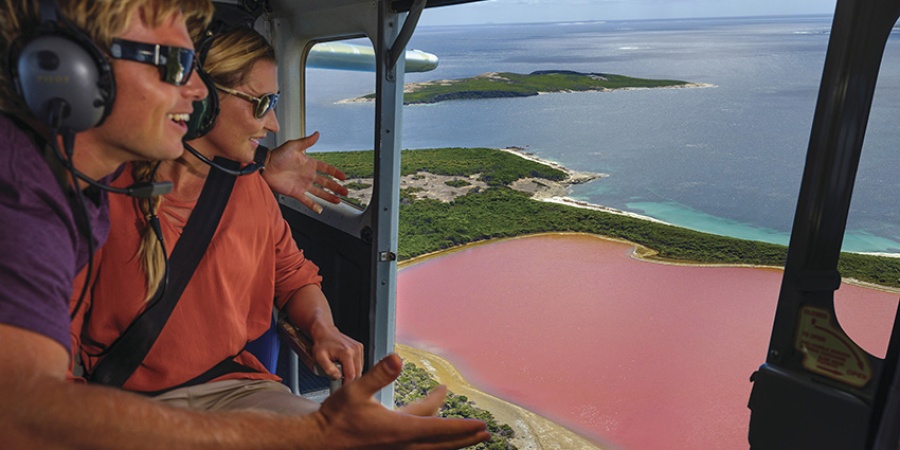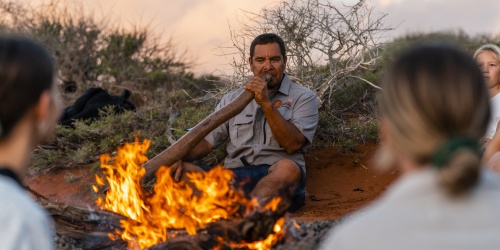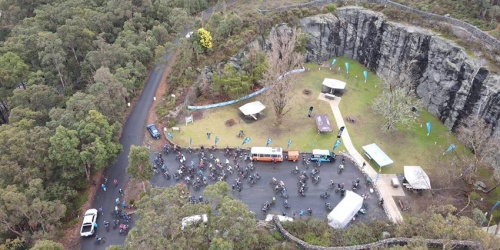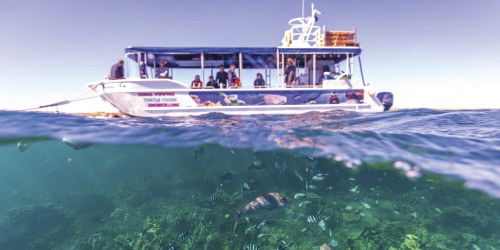
Lake Hillier, Middle Island near Esperance. Photo supplied by Tourism Western Australia
The Commercial Operator Handbook refers to a number of organisations and DBCA documents. Here is a list of useful links to those organisations and relevant documents.
- Australian Adventure Activity Standard and related Good Practice Guides (Operators and their leaders undertaking outdoor adventure activities should interpret and implement the AAAS)
- Civil Aviation Safety Authority
- Climbers Association of WA (commercial operators must abide by the association's code of ethics)
- Christian Venues Association (accreditation provider)
- Department of Fire and Emergency Services
- Aboriginal Affairs
- DBCA park brochures
- Department of Sport and Recreation
- Department of Transport
- Ecotourism Australia (accreditation provider)
- Emergency WA
- Friends of the Cape to Cape Track
- Leave No Trace Australia
- Munda Biddi Trail Foundation
- Outdoors WA (commercial operators must abide by organisation's code of conduct)
- Parks Australia
- Standards Australia (provide standard walk trail classifications)
- Small Business Development Corporation
- Home | Tourism Council WA (accreditation provider)
- Water Corporation (commercial operators in State forest must contact the corporation)
- Tourism WA
- Western Australia Visitor Centers
Western Australia's pristine environments and rich cultural heritage give the State a unique sense of place, many recreational opportunities and vast commercial benefits. To maintain a balance between conservation and commercial recreational use, DBCA grants licences to operators conducting commercial activities on lands and waters that are managed by DBCA under the Conservation and Land Management Act 1984 (also referred to as CALM Act land).
Commercial operations licences allow DBCA to enter into formal relationships with the private sector to provide innovative and ecologically sustainable services and nature-based tourism and recreation opportunities for the use and enjoyment of visitors.
They also enable DBCA to manage and monitor land uses so they are ecologically sustainable and equitable. Licence charges generate revenue that contributes to the costs of conservation and management.
Apply for a commercial operations licence online using the Commercial Operator Licensing System. A user guide to using the system to apply can be downloaded at the bottom of this page.
Who needs to be licensed?
Commercial operations licences allow operators to legally carry out commercial operations in WA’s national parks and other conservation reserves.
Anyone operating a tourism or recreation business or offering educational services for private benefit (profit) in lands and waters managed by DBCA requires a commercial operations licence. This includes tourism and recreational related products, and services such as the supply of transport, information, instruction, supervision and the sale of goods.
Examples of the types of operations that may be conducted commercially on DBCA-managed land may include, but is not limited to:
- vehicle tours
- guided walks
- boat tours and charters
- adventure operations such as mountain biking, canoeing and rock climbing
- minor facilities and services such as food vending
- corporate or commercial training.
Benefits of licensing
DBCA provides operators with up-to-date information, news, and marketing opportunities. By complying with licence requirements, operators also help ensure that the beauty and diversity of WA’s natural environments and attractions are safeguarded.
Benefits a commercial operator may receive as part of their licence include:
- a complimentary subscription to LANDSCOPE, DBCA's award-winning nature conservation magazine
- regular commercial operator alerts relaying up-to-date news and information on the State’s conservation estate, including notification of fire and road closures
- a 20 per cent discount on most WA Naturally publications when licenced operators present a valid commercial operations licence.
Types of licences
DBCA issues two types of commercial operations licences, depending on the nature of the operation. The department also issues commercial leases.
T class licences
T class licences are unlimited in number and most commercial operations in parks fall into this category. These include guided walks, vehicle tours, boat tours and charters. Licence conditions ensure environmental, cultural and visitor management objectives are met.
These licences are offered for a two-month to 10-year period depending on the level of accreditation held by the operator. Applications can be submitted and renewed through DBCA's Commercial Operator Licensing System. Two-month short-term licences are granted to operators that conduct seasonal tours only or for interstate operators who do irregular tours to the State.
T class licences usually take between seven to 10 working days to process. This is providing all correct and valid documentation is supplied with the application form, and that the proposed operations are consistent with the permitted activities for each park, as outlined in the Commercial Operator Handbook.
In some cases, DBCA may choose to conduct a higher level of assessment, which may increase the time needed for a licence to be issued.
E Class licences
Restricted E class licences are granted where there are environmental, management, safety or access reasons why licence numbers must be limited. These licences require higher performance by the operator, and have key performance indicators as well as licence conditions. Restricted E class licences generally have a higher licence charge reflecting higher management costs.
Restricted E class licences are generally allocated through a competitive process, usually be in the form of an expression of interest (EOI). This requires applicants to present their proposal and address evaluation criteria. A competitive process is fair and transparent and allows DBCA to demonstrate to applicants and the community that the most competitive operators are granted the opportunity.
Commercial Operator Handbook
All operators with a commercial operations licence are issued with a Commercial Operator Handbook. This is a legal and informative document that must always remain in the operator’s vehicle together with a copy of the licence when in lands and waters managed by the Department of Biodiversity, Conservation and Attractions.
Training
Licensees and applicants are required to complete the Commercial Operator Training Program as part of their online licence application. This training tool (available for download at the bottom of this page) ensures licence holders have read and understood the licence conditions contained in the Commercial Operator Handbook.
Commercial event applicants can review event specific training information which can be downloaded at the bottom of this page.
Accreditation
Accreditation is a licensing requirement for licence terms of one year or more. It ensures quality assurance for businesses operating in WA’s parks. Maintaining accreditation can also assist businesses with marketing, provide access to business tools and demonstrate best practice procedures and operations.
Operators must achieve and maintain accreditation through either:
- Tourism Council Western Australia’s Quality Tourism Framework (QTF)
- Ecotourism Australia's Eco Certification Program (ECO), or
- Christian Venues Association’s National Accommodation Recreation & Tourism Accreditation (NARTA).
According to the level of industry accreditation program completed, operators can apply for one, three, five, seven or 10-year licences as outlined in the table below. New operators applying for a one year licence term can apply without current accreditation, but must achieve accreditation within six months of grant of the licence.
| Licence period | Accreditation level required |
| Two months | No accreditation required |
| One year | QTF Sustainable Tourism Accreditation, NARTA, ECO Nature Tourism Certification or equivalent |
| Three years | QTF Sustainable Tourism Accreditation, NARTA, ECO Nature Tourism Certification or equivalent; Accessible Tourism and Tourism Emissions Reduction programs or equivalent |
| Five years | QTF EcoStar, NARTA, ECO Ecotourism Certification or equivalent; Accessible Tourism and Tourism Emissions Reduction programs or equivalent |
| Seven years | QTF EcoStar, ECO Ecotourism Certification or equivalent; Accessible Tourism and Tourism Emissions Reduction programs or equivalent |
| 10 years | QTF EcoStar, ECO Advanced Ecotourism Certification or equivalent; Accessible Tourism and Tourism Emissions Reduction programs or equivalent |
Tourism accessibility and emissions reduction standards
DBCA is supporting Tourism Council WA (TCWA) in its initiative to encourage greater accessibility and sustainability in the WA tourism industry.
What are the standards?
The accessible tourism standard will help operators identify how accessible their tourism experiences are and improve the availability of accessibility information and experiences.
The tourism emissions reduction standard will help operators assess and make information available to visitors on ways they are working to reduce emissions.
As visitors increasingly seek genuinely sustainable and accessible experiences, the standards will help improve tourism operations and the information available to visitors, whilst driving WA’s reputation as a destination of choice.
How can I achieve the standards?
Licenced operators can achieve the accessible tourism standard by:
- completing an online or equivalent assessment through a suitable external provider of how accessible their current operations are, including: mobility, wheelchair, hearing, visual, autism/cognitive and allergies/tolerances;
- publishing public information on their accessibility based on the assessment; and
- considering ways to make their operations more accessible.
Licenced operators can achieve the tourism emissions reduction standard by:
- completing an online or equivalent assessment through a suitable external provider to estimate emissions associated with their operations;
- developing an emissions reduction plan; and
- publishing the emissions estimate, reduction plan and commitment to reducing their emissions for the information of visitors.
TCWA provides both accessible tourism and tourism emissions reduction programs. Operators can meet the standards by undertaking these programs for their tour business.
Operators may also choose an equivalent program to assist them in meeting the standards from other suitable external providers.
Opportunity for longer term licences
Operators that commit to improving their accessibility and reducing their emissions will be eligible to apply for a longer-term licence of three years or more.
If you are applying for a licence with a term of three years or more, you are committing to achieving the accessible tourism standard by 30 November 2025 and the tourism emissions reduction standard by 30 June 2026.
Public liability insurance
Commercial operations licensees must at all times during the licence period maintain a policy of public liability insurance that is adequate and covers the areas and operations allowed under the licence for a sum of not less than AU$10 million per event.
Evidence of the insurance policy must be provided at application and at every subsequent renewal or when otherwise directed by the Director General of DBCA.
An acknowledgement of indemnity (Deed Poll) must also be signed and provided with a copy of your certificate of currency when applying for a licence. The indemnity specifies that the applicant must inform the nominated public liability insurer of the licence and its conditions. This ensures that the operator and the department is appropriately covered in the event of an accident.
Fees
Licence fees and charges are levied in accordance with the Conservation and Land Management Regulations 2002.
T class licence fees
Licence charges apply, with the amount based on the length of the licence. A four year waiver trial of the annual T class licence charge was introduced on 1 July 2024 (see below).
| Licence period | Licence charge |
| Two months | $138 |
| One years | $406 |
| Three years | $1,218 |
| Five years | $2,030 |
| Seven years | $2,842 |
| 10 years | $4,060 |
T class annual licence charge waiver trial
In February 2024, the Minister for Environment announced a waiver of the annual licence charge for T class licences as part of a four-year trial for tourism operators licensed under the Conservation and Land Management Act 1984.
Waiving this licence charge will save tour operators $406 annually and is effective from 1 July 2024 to 30 June 2028. The full media statement can be viewed here.
The licence charge waiver will be automatically applied to commercial operations licence applications made through the Commercial Operator Licensing System (COLS).
Operators that commit to improving their tour accessibility and reducing their emissions are eligible to apply for a longer licence term of three years or more. See section on tourism accessibility and emissions standards for more information.
Application Fee
There is a non-refundable fee of $117 for all licence applications. The total licence charge and application fee must be paid upfront on application.
Other fees and charges
Other fees such as entry to fee paying parks, camping fees and attraction fees may apply.
Information on commercial operator fees and charges can be downloaded at the bottom of this page. More information is available in the Commercial Operator Handbook.
Operators can pay park entry fees online using the online COLS. Please read the terms and conditions for online payments of park entry fees (available for download at the bottom of this page).
How to apply
Applications for a commercial operations licence should be made online using the Commercial Operator Licensing System. A user guide to using the system to apply can be downloaded at the bottom of this page.
Application process
As required under the Conservation and Land Management Regulations 2002, all commercial operations licenses granted by the Director General must be referred to the vesting authority, the Conservation and Parks Commission, for consultation. They are then submitted to the Minister for the Environment for approval.
If the application is for activities on lands and waters managed by DBCA that are described in the Commercial Operator Handbook, and all supporting documentation is supplied, a licence can usually be processed in seven to 10 working days. However, DBCA may determine that an application requires a higher level of assessment and this could extend the assessment process.
If an application is for commercial operations that are not consistent with the operations described in the Commercial Operator Handbook, the application may take six to 10 weeks to be processed. Alternatively, if you have an idea for a new commercial operation on land managed by DBCA, please contact the local office to discuss your proposal.
When applying for a licence, the applicant should allow enough time for the application to be processed. Please note, operations on DBCA-managed lands and waters cannot be conducted or advertised until the licence has been granted.
Existing licence holders
Keeping DBCA updated on current documentation
Operators are required to notify and provide copies of any changes to important documents relating to a licence, such as
- public liability insurance
- accreditation
- vessel certificate of survey.
Operators who have yet to been granted a licence through the Commercial Operator Licensing System will need to email updated documentation to the licensing officer at licensing@dbca.wa.gov.au.
Once you have been granted a licence through COLS, you may be required to complete or submit additional documentation as a condition of the licence. When this is required, you will receive a notification email stating a Commercial Operations Licence requirement is due.
To complete the compliance requirement, simply log in to COLS and click ‘Submit’ next to the requirement from your home dashboard. You will receive a confirmation email, and it will show on your account once your submission has been reviewed by DBCA.
Applying for credit facilities
Prior to applying for a credit facility, operators are encouraged to pay park entry fees through the Commercial Operator Licensing System (COLS).
COLS is simple to use and allows operators to pay park entry fees by credit card, prior to visiting a park with entry fees. Once a payment is made, a tax invoice and booking confirmation is sent to the operator, which can be shown to park staff on arrival and removes the need to complete a commercial activity docket.
COLS also keeps a record of all park entry fee payments and invoices paid by the operator, which can be viewed and downloaded at any time.
Operators who wish to use credit facilities for the payment of entry and other fees must complete a credit application form (available for download at the bottom of this page). They will be required to meet the following criteria:
- demonstration that the account will be active to the extent of at least $500 per month (allowing for seasonality) as determined by the Coordinator, Tourism and Concessions Branch
- demonstration of a good credit record (history with DBCA or other referees)
- if unable to meet the above criterion, a bank guarantee to an amount commensurate with the tour operator’s credit requirements
- if a company, provision of director's guarantee form (available for download at the bottom of this page).
Regardless of whether the above criteria can be met, please note a credit facility may not be approved by the department where it is deemed reasonable for an operator to use the Commercial Operator Licensing System for the payment of park entry fees.
Operators must complete an online payment or submit a DBCA commercial activity docket when entry fees are payable, even if paying by cash/cheque or credit.
Selling your business?
Licences are not tangible assets and are not transferable. Operators must explain to the prospective purchaser of a business that the licence is not transferable, and that the prospective purchaser would be required to apply for a new licence to continue the licensed operations. For more information, please refer to the Commercial Operator Handbook.
Commercial operator incident reporting
Incidents that occur during the course of operations on land managed by DBCA must be reported by the operator within 48 hours. This must be done via the Commercial Operator Incident Report Form (available for download at the bottom of this page). The following incidents must be reported:
- any incident involving the operator, or the operator’s employees or passengers, that results in a fatality or injury to any person that requires medical attention from emergency services, a doctor, medical facility or hospital
- any incident in which the safety of the operator, the operator’s employees or passengers was at risk, or where emergency services were contacted
- any damage to DBCA property caused by the operator or any of its employees or passengers, and/or
- fatality or injury to fauna that results from operator vessel or vehicle strike.
If the operator was not present at the time of the incident, the operator shall require each of its employees who were involved in or observed the incident to provide the operator with supporting reports on the incident using the Commercial Operator Incident Report Form. The operator shall submit these supporting incident reports along with his/her own incident report.
Useful links
The Commercial Operator Handbook refers to a number of organisations and DBCA documents. Here is a list of useful links to those organisations and relevant documents.
- Australian Adventure Activity Standard and related Good Practice Guides (Operators and their leaders undertaking outdoor adventure activities should interpret and implement the AAAS)
- Civil Aviation Safety Authority
- Climbers Association of WA (commercial operators must abide by the association's code of ethics)
- Christian Venues Association (accreditation provider)
- Department of Fire and Emergency Services
- Aboriginal Affairs
- DBCA park brochures
- Department of Sport and Recreation
- Department of Transport
- Ecotourism Australia (accreditation provider)
- Emergency WA
- Friends of the Cape to Cape Track
- Leave No Trace Australia
- Munda Biddi Trail Foundation
- Outdoors WA (commercial operators must abide by organisation's code of conduct)
- Parks Australia
- Standards Australia (provide standard walk trail classifications)
- Small Business Development Corporation
- Home | Tourism Council WA (accreditation provider)
- Water Corporation (commercial operators in State forest must contact the corporation)
- Tourism WA
- Western Australia Visitor Centers
- Yanchep National Park (Commercial operator online bookings and fee payments)






